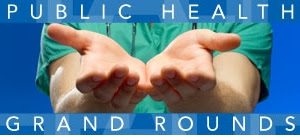
We are pleased to present the October session of Public Health Grand Rounds, “Changes in Clinical Diagnostics and Tracking Infectious Diseases.” This session will be available via live webcast from CDC headquarters in Atlanta, Georgia on Tuesday, October 18, 2016, at 1 p.m. (EDT).
When it comes to tracking infectious diseases and outbreaks, determining who is infected with a particular pathogen is the first step in solving the puzzle and stopping the spread of the disease. Traditionally, culture testing has been the primary means of identifying the specific pathogen. With this method, cultures must be evaluated in a lab setting, and results can take two or three days. Culture-independent diagnostic tests (CIDTs) are a new method for diagnosing infections, and they are often used to identify foodborne illness. CIDTs work by detecting the presence of a specific genetic sequence or antigen of a germ.
These newer tests are faster, and results are available much sooner than with traditional culture tests. However, CIDTs don’t identify the exact organism that caused the illness, and they don’t provide some of the more detailed information that culture tests can. For example, CIDTs don’t tell us what specific strain of an illness someone has, or how it may respond to antibiotics. Using only CIDTs makes it more difficult to connect individual infections to the same strain and to identify outbreaks.
In this session of Public Health Grand Rounds, you will hear how CIDTs are changing the landscape of diagnosing infectious disease. Speakers will also discuss how the tests are evolving, and how some states are adapting to using CIDTs in their public health systems.
Future Grand Rounds topics include sickle cell disease across the lifespan and public health law.
Email your questions about this topic before or during the session. Follow us on Twitter #cdcgrandrounds
CDC’s Public Health Grand Rounds Presents:
“Changes in Clinical Diagnostics and Tracking Infectious Diseases”
Tuesday, October 18, 2016
1:00 p.m. – 2:00 p.m. EDT
Global Communications Center (Building 19)
Alexander D. Langmuir Auditorium
Roybal Campus
Presented By:
Chris Braden, MD
Deputy Director
National Center for Emerging and Zoonotic Infectious Diseases, CDC
“The Impact of Culture-independent Diagnostic Testing in Foodborne Diseases”
Alicia Cronquist, RN, MPH
Foodborne Disease Program Manager, Communicable Disease Branch
Colorado Department of Public Health and Environment
“Managing New Diagnostic Tests in Colorado”
Brad Spring, BS
Vice President, Regulatory Affairs & Compliance
BD Life Sciences (representing AdvaMedDx)
“Advancing Diagnostic Innovation and Public Health Needs”
John Besser, PhD
Deputy Chief, Enteric Diseases Laboratory Branch
Division of Foodborne, Waterborne, and Environmental Diseases
National Center for Emerging and Zoonotic Infectious Diseases, CDC
“Next Steps: Direct-from-specimen Testing to Characterize Pathogens”
Facilitated By:
John Iskander, MD, MPH, Scientific Director, Public Health Grand Rounds
Phoebe Thorpe, MD, MPH, Deputy Scientific Director, Public Health Grand Rounds
Susan Laird, MSN, RN, Communications Director, Public Health Grand Rounds
For non-CDC staff interested in viewing the session:
A live external webcast will be available via the Webcast Links section of our website. For individuals who are unable to view the session during the scheduled time, a video of the session will be posted to our archives 2-3 days after the presentation.
For non-CDC staff who wish to attend in person:
Due to security measures at CDC’s Roybal campus, non-CDC staff who wish to attend these sessions in person must have prior clearance and a U.S. state-issued photo ID (e.g., driver’s license, US passport). Names of non-CDC staff (both domestic and international) who wish to attend in person should be submitted to the Grand Rounds Team. Please note that all information for international visitors must be submitted at least 10 business days in advance.
For individuals requiring reasonable accommodations:
It is the policy of CDC to provide reasonable accommodations (RA) for qualified individuals with disabilities to ensure their full inclusion in CDC-sponsored events. Employees are asked to submit RA requests at least 5 business days prior to the event. Please e-mail the request to grandrounds@cdc.gov.
Grand Rounds is available for Continuing Education.
ALL Continuing Education hours for Public Health Grand Rounds (PHGR) are issued online through the CDC/ATSDR Training and Continuing Education Online system. If you have questions, e-mail or call Learner Support at 1-800-418-7246 (1-800-41TRAIN).
Those who attend PHGR either in person, Envision, IPTV, or “web on demand” and who wish to receive continuing education must complete the online seminar evaluation. Thirty days from the initial seminar the course number will change to WD2346 and will be available for continuing education until February 18, 2018. The course code for PHGR is PHGR10.
Target Audience: Physicians, nurses, epidemiologists, pharmacists, veterinarians, certified health education specialists, laboratorians, others
Objectives:
- List key measures of burden of disease involving morbidity, mortality, and/or cost.
- Describe evidence-based preventive interventions and the status of their implementations.
- Identify one key prevention science research gap.
- Name one key indicator by which progress and meeting prevention goals is measured.
CE certificates can be printed from your computer immediately upon completion of your online evaluation. A cumulative transcript of all CDC/ATSDR CE’s obtained through the TCE Online System will be maintained for each user. We hope that this will assist CDC staff and other public health professionals to fulfill the requirements for their professional licenses and certificates.
Learn more about continuing education on the Grand Rounds website.





















.png)









No hay comentarios:
Publicar un comentario